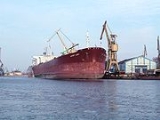
Overseas Tankship v Miller Steamship
Encyclopedia
Overseas Tankship Ltd v The Miller Steamship Co or The Wagon Mound (No 2) [1967] 1 AC 617 is a landmark tort
case, concerning the test for breach of duty of care in negligence. The Judicial Committee of the Privy Council
held that loss will be recoverable where the extent of possible harm is so great that a reasonable man would guard against it (even if the chance of the loss occurring was very small).
The Wagon Mound (No 2) should not be confused with the previous case of the Overseas Tankship (UK) Ltd v Morts Dock and Engineering Co Ltd or The Wagon Mound (No 1), which introduced remoteness as a rule of causation to limit compensatory damages.
The appeal to the Privy Council was on the basis of whether the defendant should be liable.
The words "real risk" are the requirement of remoteness of damage but the test of foreseeability does not depend upon the actual risk of occurrence. The test is really whether the engineer ought to have foreseen the outbreak of fire, i.e. the type of consequence ought to have been foreseen.
159 F.2d 169 (2d Cir. 1947) on the subject of legal causation. Such a formulation of the issue has struck some in the field as an argument along the lines typically made in the Law & Economics camp usually seen to be represented by the American Judge Richard Posner
.
Tort
A tort, in common law jurisdictions, is a wrong that involves a breach of a civil duty owed to someone else. It is differentiated from a crime, which involves a breach of a duty owed to society in general...
case, concerning the test for breach of duty of care in negligence. The Judicial Committee of the Privy Council
Judicial Committee of the Privy Council
The Judicial Committee of the Privy Council is one of the highest courts in the United Kingdom. Established by the Judicial Committee Act 1833 to hear appeals formerly heard by the King in Council The Judicial Committee of the Privy Council (JCPC) is one of the highest courts in the United...
held that loss will be recoverable where the extent of possible harm is so great that a reasonable man would guard against it (even if the chance of the loss occurring was very small).
The Wagon Mound (No 2) should not be confused with the previous case of the Overseas Tankship (UK) Ltd v Morts Dock and Engineering Co Ltd or The Wagon Mound (No 1), which introduced remoteness as a rule of causation to limit compensatory damages.
Facts
The defendant owned a freighter ship named the Wagon Mound which was moored at a dock. The plaintiff owned two ships that were moored nearby. At some point during this period the Wagon Mound leaked furnace oil into the harbour while some welders were working on a ship. The sparks from the welders caused the leaked oil to ignite destroying all three ships.The appeal to the Privy Council was on the basis of whether the defendant should be liable.
Judgment
The Council found that a reasonable person in the position of the ship's engineer would have been aware of the risk of fire. Since the gravity of the potential damage from fire was so great there was no excuse for allowing the oil to be discharged even if the probability or risk of fire was low. A reasonable person, the Council held, would only neglect a risk of such a potentially great magnitude if he or she had a reason to do so, e.g. if it were cost prohibitive. Lord Reid said at 718-719,The words "real risk" are the requirement of remoteness of damage but the test of foreseeability does not depend upon the actual risk of occurrence. The test is really whether the engineer ought to have foreseen the outbreak of fire, i.e. the type of consequence ought to have been foreseen.
Significance
This idea of a balance between magnitude and seriousness of risk is similar to that proposed by Learned Hand in United States v. Carroll Towing Co.United States v. Carroll Towing Co.
United States v. Carroll Towing Co. 159 F.2d 169 is a decision from the 2nd Circuit Court of Appeals that proposed a test to determine the standard of care for the tort of negligence...
159 F.2d 169 (2d Cir. 1947) on the subject of legal causation. Such a formulation of the issue has struck some in the field as an argument along the lines typically made in the Law & Economics camp usually seen to be represented by the American Judge Richard Posner
Richard Posner
Richard Allen Posner is an American jurist, legal theorist, and economist who is currently a judge on the United States Court of Appeals for the Seventh Circuit in Chicago and a Senior Lecturer at the University of Chicago Law School...
.
See also
- Re PolemisRe PolemisRe Polemis & Furniss, Withy & Co Ltd [1921] 3 KB 560 is a famous United Kingdom tort case on causation and remoteness. The Court of Appeal held that a defendant can be held liable for all consequences flowing from the wrongful conduct regardless of how unforeseeable.-Facts:The defendant's employees...
, [1921] 3 K.B. 560 - Overseas Tankship (U.K.) Ltd. v. Morts Dock and Engineering Co. Ltd.Overseas Tankship (U.K.) Ltd. v. Morts Dock and Engineering Co. Ltd.Overseas Tankship Ltd v Morts Dock and Engineering Co Ltd or "Wagon Mound " [1961] is a landmark tort law case, which imposed a remoteness rule for causation in negligence. The Privy Council held that a party can only be held liable for damage that was reasonably foreseeable...
(Wagon Mound No. 1), [1961] 1 All E.R. 404 (P.C.) - List of Judicial Committee of the Privy Council cases
- Torts

